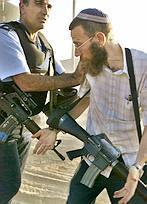Gaza Strip pullout leads to no civil war, Arabs determined to continue fighting
It is not known yet, how Palestinians are going to use the emptied land
Israeli Prime Minister has gained his ends: no one doubts now that there will be any Jewish settlers left in the Gaza Strip by the end of the current month. The recent two days showed, however, that about 8,000 settlers residing in the Gaza Strip did not venture to stand up against the Israeli army despite quite bellicose sentiments in the conflict region. One may thus infer that there will be no civil war in Israel as a result of the Gaza pullout. 
It goes without saying that it is impossible to avoid outbursts of violence when troops oust their country-fellows from their homes. A Jewish settler opened fire on Arabs yesterday: three Palestinians were killed and five wounded. This tragedy in the West Bank of Jordan became the second incident within one month, when an Israeli extremist opened fire on Arab nationals. Israeli citizen Elena Bosem (54) set herself ablaze trying to express her protest against the forcible evacuation of Jewish settlements. The fire burnt 70 percent of the woman's body; the patient is staying in severe condition, doctors say. Nineteen other people were slightly injured during the evacuation process. One of the settlers stabbed a military woman with a syringe; a door fell down on a journalist, who was helping one of the leaving families pack their things. Another settler dangled his one-year-old baby over a balcony for several hours, threatening to drop the child, if only police officers or military men dared to approach the house. The problem was settled after a conversation with a psychologist.
The forcible evacuation of Jewish settlements from the Gaza Strip: Photo gallery
Israel Defense Force's operations chief Yisrael Ziv said, that the evacuation process was moving faster than it was originally planned. The first day of the evacuation left the settlements of Tal-Katifa, Kerem-Astmona, Ganei-Tal, Bedolah and Morag completely deserted.
Those settlers, who do not show any resistance during the forcible evacuation, will be paid the $400,000 compensation per family. Not less than a thousand families have already left the Gaza Strip. There were settlers, who tried to influence Israeli soldiers and police officers: “We look into their eyes, we talk to each and everyone of them, whom we meet. We just can't believe that they do not have a heart. They will see all this and our faces in their nightmares for a long time,” a woman from the community of Neve Dekalim said.
Some of the protesting settlers hoped that Israeli soldiers would not dare to evacuate them from synagogues, although the hopes did not prove to be justifiable. Military men simply carried the settlers out of their shelters. There are 30 synagogues and eight religious schools in the Gaza Strip, which remain the last stronghold of the ousted Jewish settlers.
When the forcible evacuation ends, none of the 21 Jewish settlements will be left in the occupied Gaza Strip. Four other communities will be evacuated from the north of the West Bank of Jordan (Samaria). It is not known, however, which influence the demarcation is going to exert on the Israeli society in the nearest future.
The orange color has come to symbolize the settlers' protest against the evacuation from their homes. The number of protesters counts almost a quarter of the five-million-strong Jewish population. The “orange protesters” consider both the Gaza Strip and the West Bank of Jordan to be historically Jewish territories. About 200,000 Jews live in the settlements in the West Bank of Jordan. It is noteworthy that about 25 percent of Jews support the demarcation process.
Palestinians, in their turn, describe the current evacuation as the end of the 38-year-old occupation of the Gaza Strip, which Israel occupied in 1967. The land will come into Palestine's administration only in the beginning of October, though. Israeli soldiers are to demolish houses and conduct other necessary preparations in September.
It is not known yet, how Palestinians are going to use the emptied land. There will probably be a new town built on the site, where the settlement of Gush Katif is located. However, Palestinian authorities will have to give jobs to people and create the necessary infrastructure in the new town too, which will be a much harder goal to pursue. The economy of Palestinian territories is traditionally connected with the Israeli economy. Palestine does not even have the monetary unit of its own. Some Israeli specialists do not exclude a serious aggravation of the situation in the Gaza Strip after the forthcoming elections, saying that Hamas activists may win. Municipal elections are set to begin in Palestine at the end of September; parliamentary elections will take place at the end of January. On the other hand, the international community, especially the USA, is not likely to let Hamas leaders rule in Gaza.
Unlike Jewish settlers, the majority of Palestinians do not think that Ariel Sharon is going to pull out Jewish settlements from the rest of the West Bank. Arabs are therefore determined to continue the struggle to entirely oust Israelis from the territories, which they conquered in 1967.
Subscribe to Pravda.Ru Telegram channel, Facebook, RSS!




